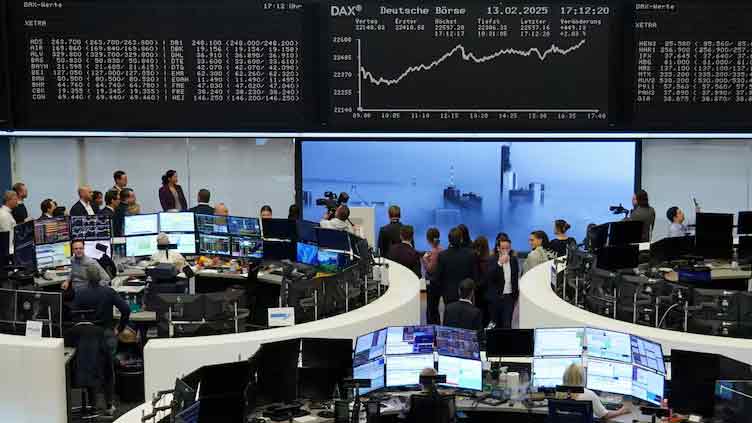Asian stocks stutter as Trump's tariff vows weigh

Business
Trump has imposed a 10% tariff on all imports from China
NEW YORK/SINGAPORE (Reuters) - Asian stocks wavered on Wednesday after the S&P 500 and European shares ended at record highs, in the face of U.S President Donald Trump's latest tariff threats on auto, semiconductor and pharmaceutical imports.
Since Trump's inauguration four weeks ago, Trump has imposed a 10% tariff on all imports from China, on top of existing levies. He has also announced, and delayed for a month, 25% tariffs on goods from Mexico and non-energy imports from Canada.
Trump told reporters on Tuesday that sectoral tariffs on pharmaceuticals and semiconductor chips would start at "25% or higher, and it will go very substantially higher over the course of a year." He intends to impose similar tariffs on autos as soon as April 2.
Market reaction to Trump's threats were muted as investors increasingly see them as bargaining tools, although the US dollar was on the front foot as geopolitical worries, including tense Russia-Ukraine negotiations boosted safe-haven flows.
"I think people are still trying to digest everything going on with not only tariffs and how that could impact things but also general valuations," said Sandy Villere, portfolio manager at Villere & Co in New Orleans. "We feel like the market is pretty expensive."
"You've got not only the tariff situation, which I think is going to be more sabre-rattling and negotiating than anything long-term," Villere said.
MSCI's broadest index of Asia-Pacific shares outside Japan (.MIAPJ0000PUS) fell 0.29% after touching a three-month high earlier in the session.
Chinese tech stocks (.HSTECH) have been on a tear recently as the emergence of AI startup DeepSeek and a meeting between Xi Jinping and business leaders in the sector lift sentiment.
"Green shoots are emerging in China’s economy and DeepSeek is injecting a shot of adrenaline into the sector," said Thomas Rupf, co-head Singapore and CIO Asia at VP Bank.
"While trade risks persist, tech optimism remains strong as the prospect of low-cost AI applications drives a reassessment of growth potential."
Hong Kong's Hang Seng Index (.HSI) fell 0.3% as investors pocketed some profits. The index has risen over 13% so far in 2025, jostling with Germany's DAX index for best-performing market in the world.
Hang Seng Tech stocks has far outperformed tech-heavy Nasdaq since late September when China unleashed stimulus measures
KIWI CLIPPED
The New Zealand dollar fell 0.35% to $0.5684 after the country's central bank flagged a steeper trajectory for future rate reductions following a 50 basis-point cut to 3.75% on Wednesday.
The latest easing was in line with expectations but the central bank is now forecasting the cash rate will drop to 3.4% in the second quarter of 2025 and to 3.1% by the end of 2025, lower than November's expectations.
The Australian dollar eased 0.11% to $0.6347 a day after the central bank delivered its first rate cut since 2020, but cautioned about the prospects for further easing.
Overnight, the US benchmark S&P 500 squeaked past its previous record closing high as all three Wall Street indexes seesawed between gains and losses for much of the session before rising in the closing minutes.
European shares ended at a record high, with banking and defence stocks among the top gainers. The pan-European STOXX 600 index hit an all-time high of 557.96.
European leaders vowed to step up support for Ukraine as the US and Russia held bilateral talks on the war this week. Investors also hope this weekend's German election will lead to economic stimulus.
Minutes from the US Fed's January meeting, when the central bank held borrowing costs at 4.25% to 4.5%, are due later on Wednesday. That follows hawkish comments from Fed Chair Jerome Powell in testimony to Congress last week and hot consumer price data.
Brent crude oil rose 0.11% to $75.92 a barrel as traders awaited the outcome of the US-Russia talks in Riyadh and speculated about potential supply increases if Washington agrees to abandon sanctions on Russian oil.
Spot gold was little changed at $2,933 an ounce, stalking the record high it touched last week on safe haven demand.


